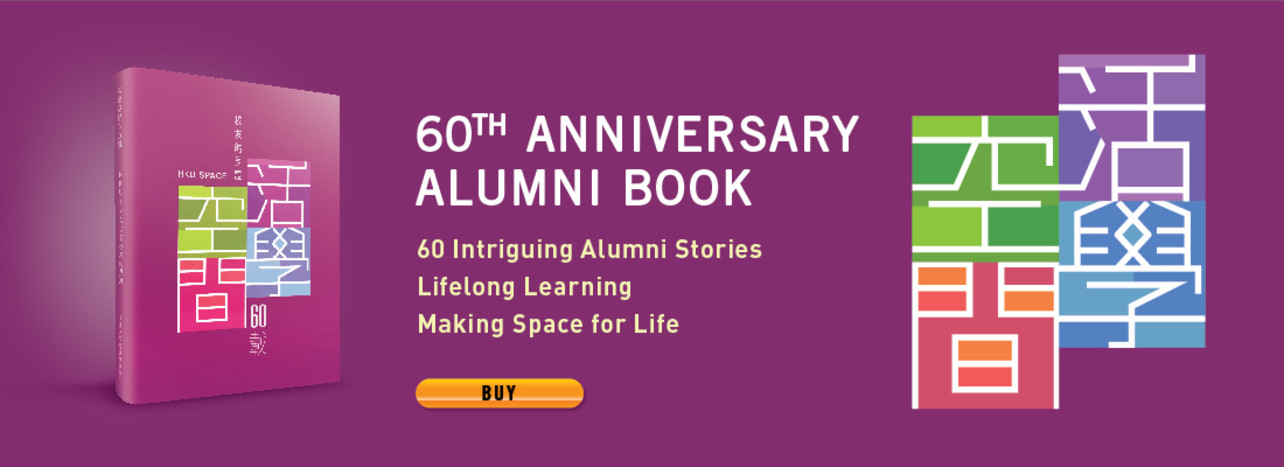
- 中文
- Search
60th Anniversary Alumni Book
The Birth of Making SPACE for Hong Kong 60 Years and Beyond – Alumni Stories
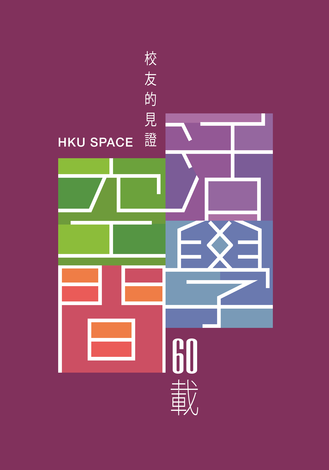
Book Cover
On 21 May 1957, the Court of Hong Kong University (HKU) formally established the Department of Extra-Mural Studies of HKU (DEMS, the predecessor of HKU SPACE), to provide weekend and evening programmes catering to those who have left school and full-time employees. This was a ground-breaking move; back then, HKU was the only tertiary institute that offered continuing education. In his congratulatory message to the new department, HKU Vice-Chancellor Sir Lindsay Ride said, "Planned aright and if given full scope, it will touch every section of the community, every stratum of our society... making available to the masses the knowledge accumulated by the few."
Since then, the School has kept abreast of Hong Kong's development as it responds to society's educational needs. To support the government's policy on educational development, the School has steadfastly taken on the responsibility to inspire life-long learning, helping adults from various sectors and industries of society continue their education through professional and quality programmes.
HKU SPACE is celebrating its 60th anniversary in 2017. To mark this historic occasion, the School is publishing Making SPACE for Hong Kong 60 Years and Beyond – Alumni Stories. In this book, HKU SPACE revisits its pioneer programmes and the growth of its faculties. Divided into six sections that coincide with developments in society and education, the book examines how past chairmen of the Board of Directors, directors of the School, and presidents of HKU SPACE Alumni Council have led the School through its milestones. It also bears witness to the School's illustrious accomplishments through testimonials from 60 alumni about their education and experiences, as well as through stories of how School graduates have achieved success and contributed to society through their studies.
This book holds great significance for both HKU SPACE and Hong Kong's education sector as a whole.
HKU SPACE's pioneer programmes and major developments
1960s: Programmes on Legal Studies, Housing, Library, Management Studies, Art & Design and Languages
1970s: Programmes on Medical Laboratory, Information Technology, and Human Resources
1980s: Programmes on Dietetics, Accounting and Finance
1990s: Programmes on Chinese Medicine, Sports & Recreation
2000s: Programmes on Anti-Corruption and Associate Aegree programmes for HKU SPACE Community College and HKU SPACE International College
2010s: Programmes for HKU SPACE Institute for China Business
Purchase details
Original price: HK$128
Special alumni price: HK$98
(Language of the book: Chinese)
Options for purchasing the book:
- Online
- Order Form
- HKU SPACE Staff Order Form
- SPACE Station, 3/F, Admiralty Centre, 18 Harcourt Road, Hong Kong (next to the enrolment counter)
- All major bookstores (special alumni price not available)
Excerpts
| Dr Ko Wing Man | Mr Fung Kam Keung | Dr Ambrose So | Mr Law Hiu Fung | Mr Lam Chiu Ying |
| Mr Benny Cheung | Ms Tanya Chan | Ms Ng On Yee | Dr Rita Fan | Mr Stone Tsang |
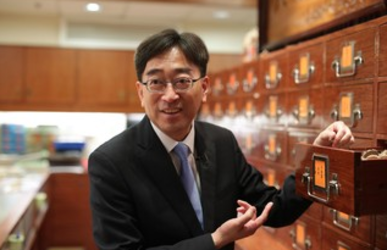
Dr Ko Wing Man
"I first got into the School about 20 years ago, when Hong Kong's medical landscape was about to undergo a dramatic change. I was working at the Hospital Authority when I first heard that Hong Kong had planned to promote and develop Chinese medicine. As a veteran doctor of Western medicine, I couldn't afford to be complacent, so I enrolled in six Chinese medicine programmes at HKU SPACE. During my 18-month study term, I had to attend class three times a week. I was never absent. It was difficult, since I had to rush to the class every time after work. But it benefitted me, and was vital when I helped spearhead the development of Chinese medicine in Hong Kong."
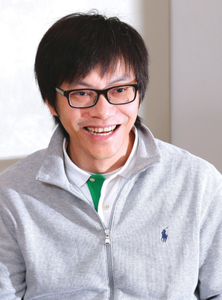
Mr Fung Kam Keung
Fung Kam Keung could not get into a university because of a disappointing DSE result. His failing grade in Chinese History upset him in particular. His teacher comforted him and suggested that since he had passed both his Chinese and English language exams, he should enrol in an associate degree to keep his university dream alive. Fung took that advice and enrolled in a HKU SPACE associate degree in computer science, where he scored a high GPA of 3.8 the following year and successfully got into The Chinese University of Hong Kong. Although still a student, his career was already riding high. "I've worked as a broadband service salesman during the summer vacation since my Form 6 year. In one year, when I was already a university student, I earned over HK$300,000 in just three months!" He continued, "Later, my performance prompted a very senior executive to meet me. That was when he realised that I was a university student."
One of his colleagues inspired him to develop an app called iSafe. This app allows users to set a pair of passcodes that safeguard information on their mobile phones; others will have limited access to information if they are given one of the two passcodes." I put my new app in the app store, and in one month I earned more than HK$600,000! It sells especially well in Japan and Germany."
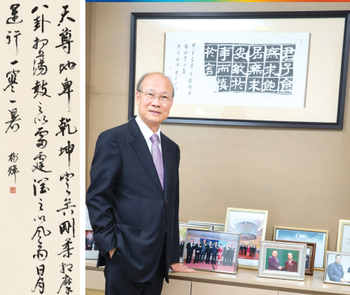
Dr Ambrose So
Dr Ambrose So is currently the Chief Executive Officer of SJM Holdings Limited. Back in his primary school days, Dr So spent his free time at a small fish pond near his school's playground. He was fascinated not by the fish swimming in the pond, but by the stone next to it – and his school principal's calligraphy on the stone. The experience evoked his interest in calligraphy, prompting him to begin practising himself. After graduating from HKU, Dr So worked at several companies before finally settled down at SJM. Through a friend, he was introduced to Calligraphy Basics, a course at DEMS (the predecessor of HKU SPACE). This short course rekindled the foundation of his calligraphic practice.
"At work, we can easily be moulded into certain expectations. Through calligraphy, I can show others this side of myself," Dr So said. "This surprises people, and most importantly, makes me seem more approachable and friendly, which in turn has helped my career and social life." Dr So had expected calligraphy to be a means to satisfy himself in his pursuits in life. He never expected that calligraphy would also be a bridge to connect cultures and drive his career development.
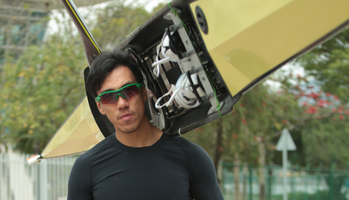
Mr Law Hiu Fung
Law Hiu Fung was a member of Hong Kong's rowing team; for his prowess, he won a Hong Kong Sports Stars Award in 2003. However, after the Beijing Olympics, Law began to think about his career — how long could he remain an athlete? After some research, he decided to enrol in HKU SPACE, and in two years successfully completed his Certificate in Recreation and Sports Management and his Advanced Diploma in Recreation and Sports Management. According to Law, going back to school was an amazing experience. "Those are well-rounded courses," he said. "They taught me the sports system, development and infrastructure of Hong Kong and other countries, how to manage and lead a sports team, and how to apply for subsidies." Besides gaining knowledge, Law said, he also broadened his social circle, which brought changes to his personality. However, he believed his greatest achievement was that after taking all those courses, he now finally understands the reasons behind his coach's "unreasonable demands" all those years ago!
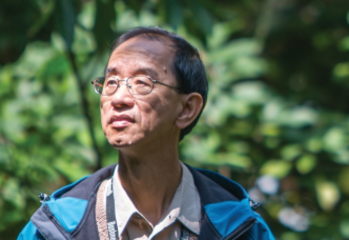
Mr Lam Chiu Ying
In 1976, Lam Chiu Ying took a HKU SPACE course on bird watching that drastically changed his attitude towards life. Deciding to learning bird watching was just a chance decision, but it has turned out to be Lam's lifelong passion. Not only has it improved his powers of observation, it has also provided him with great inspiration in his thoughts and attitude towards work. "I think it was destiny," said Lam. "Before, I wasn't really aware there were birds around me. But after the course, I realised they were everywhere, their playful pursuits, fights, courtships, foraging and feeding all blending seamlessly with nature. I like to project these images into my life and think about human beings. It's a magical feeling to open up your heart and connect with the world around you. It's an eye-opening experience."
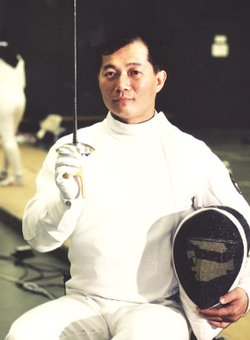
Mr Benny Cheung
Before his retirement, Benny Cheung served as Assistant Divisional Officer in Fire Services; now, he is the Chairman of Hong Kong Joint Council for People with Disabilities, and the winner of four gold medals at the 1996 Summer Paralympics. On 9 September 1983, Typhoon Ellen hit Hong Kong, and then-Probationary Station Officer Cheung joined the Mount Davis rescue team and gave his all to help save people. Unfortunately, during the rescue operation, his left leg was crushed by fallen rocks and had to be amputated. A young man in his twenties, Cheung was naturally depressed by his injury, but he opted to look on the bright side, keeping fit through various sports, including wheelchair basketball, wheelchair table tennis, swimming, and canoeing. When he first encountered fencing, he fell in love with it. Later, Cheung enrolled in the Master of Arts in Recreation and Sports Management, a programme jointly offered by HKU SPACE and Australia's Victoria University. "Swimming and fencing are physical activities, but what the course taught me was the theory behind it, using data to analyse the effectiveness of each movement," said Cheung. "It not only broadened my horizons, but also fostered my logical thinking." The course also taught him how to handle things systematically, which has been a big help in his public service.
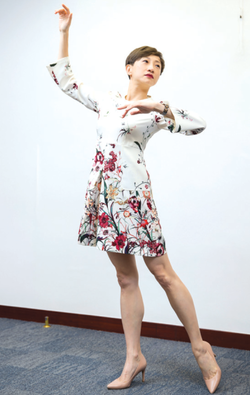
Ms Tanya Chan
Once the serious anti-corruption discussion was over, Tanya Chan couldn't wait to talk about learning to dance at HKU SPACE. Her story was about a young lady's passion for dancing, interwoven with romance and sweat. "I would stay up late to practise every night after finishing my homework, when all my family members had gone to bed," she recalled. "To study the steps, I would play the tapes I bought, which were really expensive. But the value I received in return was more than just what it taught me about dancing... It also helped me understand more about myself."
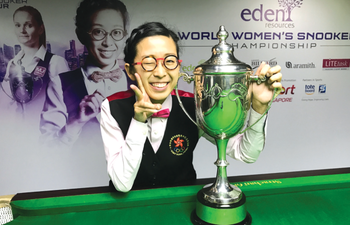
Ms Ng On Yee
At 24, snooker player Ng On Yee enrolled in HKU SPACE's Advanced Diploma in Accounting. "After becoming a professional athlete, I went to many events that made me reflect on my inadequacy of knowledge in many fields," she said. "So, I decided to take up studying again." Although the accounting course did not improve her snooker skill, it widened her horizons, which was exactly why she took the course. "This time around," she said, "studying feels very different, because it's my own choice." Although the course reduced her time for training on the tables, she found it beneficial because it enabled her to return with a refreshed mind and an increased appreciation for her sport.
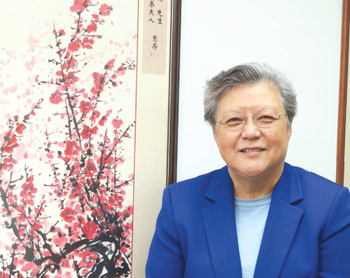
Dr Rita Fan
A former president of the Legislative Council of Hong Kong, Rita Fan has devoted herself to student counselling services for two universities for over 20 years. As a fresh graduate, she was hired by HKU's employment centre as an administrative assistant. Her responsibility was finding jobs for graduates that suited their skills and abilities, while helping companies find appropriate candidates for their openings amongst these graduates. The job required tremendous knowledge about recruiting and personnel management, but Fan realised her science degree did not give her the training to handle it. To equip herself, she enrolled in in DEMS and earned her Certificate in Personnel Management.
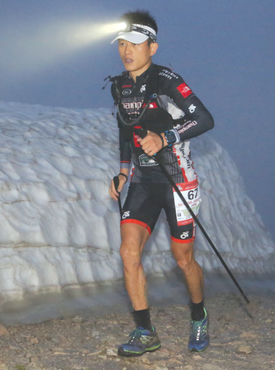
Mr Stone Tsang
After obtaining an Advanced Diploma in Fitness and Exercise Studies, Stone Tsang went on to acquire his Bachelor of Science (Honours) in Work Based Learning Studies (Fitness and Exercise) from HKU SPACE. "I enjoy sports, but I thought I didn't have enough knowledge of it," he said. "That's why I selected this course when I decided to further my studies."
As a nature-lover, Tsang has been disappointed to see Hong Kong's lush green trails being paved with concrete. "When citizens voiced their objections to the concrete paths, the government said that concrete trails were safer for kids, seniors and regular users. The truth is, the original, muddy trails are best for our health," said Tsang. "I learned from my HKU SPACE course that hiking or running on muddy paths strengthens our core muscles better than concrete paths. In addition, because I'm frequently involved in mountain rescue missions, I know that a lot of accidents and injuries in parks aren't caused by undeveloped environments. Rather, many are caused by insufficient preparation or a lack of safety awareness on the part of the hikers. The solution to preventing these accidents lies not in paving more paths, but in educating the public."

